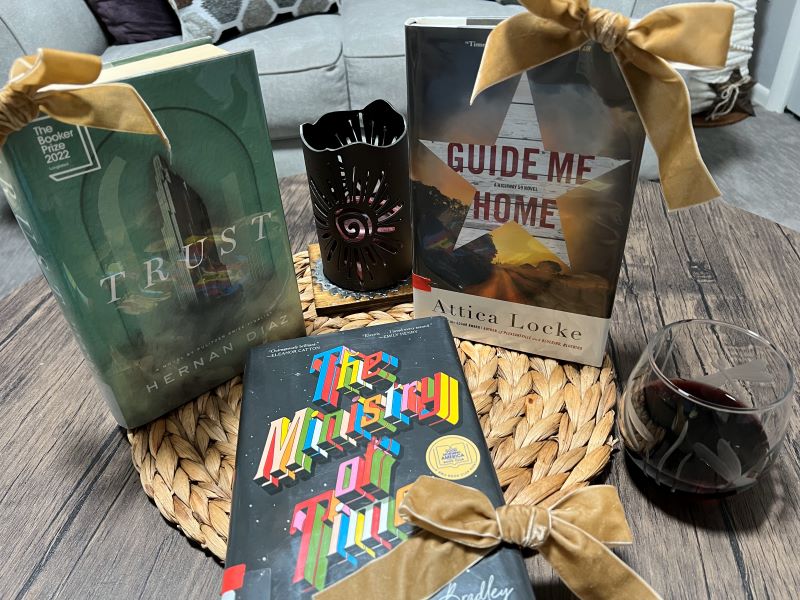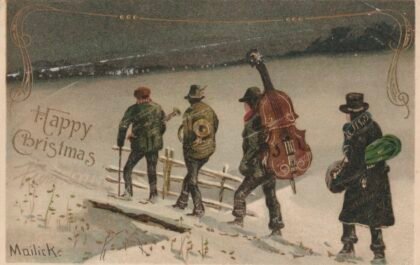
In the spirit of the season, I offer a few books that you might consider as a treat to yourself or, as my title suggests, as a gift for others.
It is cliché to write that this or that book is a “page turner” or “I could not put it down” or “thrilling from the first page to the last.” It is less often written that a particular book requires patience and that the reader must invest some time before being rewarded with its primal intent. In Trust (2022) by Pulitzer Prize finalist Hernan Diaz, I encountered a remarkable literary technique that captivated me at first with a simple story; and then threw a wrench into the whole thing. Even as I wondered if I had somehow lost my place, the delightful prose kept me at it.
The primary character in the opening section is Benjamin Rask who came of age in a home of privilege in the late nineteenth century’s Gilded Age New York. Through his investments during World War I and the 1920s he turned his family’s small fortune into a massive one. Those who followed his lead made money as well. So confident were they that many used their paper wealth as collateral for borrowing money to invest even further. Someone with $1000 could purchase as much as $10,000 in stock because similarly confident bankers would loan the additional $9000. This borrowing to invest is known as buying stock on margin.
Rask’s stock selections were monitored closely and he was revered as an Oracle on Wall Street. As the markets soared, Rask noticed that many investors were assuming that the bull market would continue forever. In the summer and early fall of 1929, Rask prepared for what he believed was the inevitable crash. Not only did he avoid the pain of the Stock Market Crash of 1929, he positioned himself to profit handsomely from it.
Following the crash, while banks called upon borrowers to repay the margin loans, those who had deposited money in the banks rushed to pull their money out. Since borrowers were unable to pay back their loans, depositors arrived at the banks only to discover that they had simply gone out of business. As the American economy crumbled, Benjamin Rask became one of the wealthiest men on the planet.
This first part of Hernan Diaz’ Trust—a simple story that has been told before— was beautifully written in just over 100 pages. I enjoyed it. The next 50 pages or so confused, befuddled, perplexed, mystified, baffled, and puzzled me (shout out to Mr. Thesaurus for that one).
While there was a similarity of setting within these exasperating pages, I had no idea who these new characters were or how they fit into the story of Benjamin Rask. I became so frustrated that I almost assigned this one a Q for Quit in order to move on to the next book of several waiting on my shelf. I’m not sure why I stuck with it but, looking back, it may have something to do with the book jacket blurbs describing Hernan Diaz as a “narrative genius” engaged in “jaw-dropping storytelling.” I cannot say how pleased I was that I stuck with it because somewhere after the 200 page mark, my jaw dropped as the frustration I had felt morphed into wonder.
This is an amazing book whose delightful prose shines a light on the manner in which wealth inequality has always been a defining characteristic of our country. It also offers up the manner in which history is so often simply that which the historian chooses it to be.
This is one of the most fascinating books I have ever read and I couldn’t be more pleased to discover that three more Hernan Diaz novels await: In the Distance (2017), Preston Bound (2018), and On the Rum in Tijuana (2020).
Another delightfully entertaining book is the debut novel of British-Cambodian writer Kaliane Bradley, The Ministry of Time (2024). The first-person narrator and protagonist goes unnamed although the descriptors shared very closely resemble the author herself—daughter of a Cambodian mother and a British father. Originally set in London of the near future, this unique time-travel adventure also artfully illustrates the tragic 1845 British expedition to the Arctic led by Sir John Franklin.
The narrator is hired to be a “bridge” within a top secret government program established to test the viability of a newly-discovered time-travel machine. The titular ministry is tasked with plucking a few “expats” from different points in the past to see how they hold up both physically and emotionally.
Concerned that pulling a person from the past into their future might disrupt the whole space-time thing, the expats chosen are plucked very near the time of their known historical death. In the case of the Franklin Expedition, the entire crew was eventually lost after their ships were trapped in ice, so the “disappearance” of Commander Graham Gore is simply seen as another fatality among others that was to occur anyway.
The narrator is Gore’s bridge who comes to be called “1847” or “47”, the year of his “death.” In Gore’s experience, he goes from freezing in the Arctic to a modern lab and eventually into the robust cultural environment of twenty-first century London; which means his bridge has a great deal of work to do while acclimating the nineteenth century British Royal Navy Commodore to the modern world.
The other expats are plucked from decisive moments in British history; 1645, 1665, 1793, and most interestingly 1916. Lieutenant Thomas Cardingham (16) is transported to his future while fighting in the trenches during the Battle of the Somme in World War I. Not only does he see this development as a rather pleasant bit of luck, he quickly realizes that he has arrived in a Britain much more tolerant of his nature.
This is a fun story with many twists, a great deal of cultural commentary, and a ton of laughs, all delivered with the prose and catchy dialogue of a burgeoning master storyteller.
I first came across Attica Locke shortly after she published the second of her Highway 59 trilogy, Bluebird, Bluebird (2017) and Heaven, My Home (2019). Set in East Texas of the very recent past, these crime novels follow Texas Ranger Darren Matthews as he navigates racially treacherous waters including the presence of the Aryan Brotherhood of Texas.
Attica Locke and her family grew up along the real Highway 59 that runs roughly north and south through East Texas close to the Louisiana border. This setting and the happenings in this trilogy are drawn from her real-life experiences.
While the racial tensions portrayed in the first volume echo the segregation and violence of this region’s past, the second Highway 59 novel, published in the second year of Donald Trump’s first administration begins to demonstrate just how sharply this part of the country has been rattled by the MAGA movement. In the early pages of the third volume, Guide Me Home (2024), published as Trump is rising to power again, Locke lays out what many of us don’t really experience; although it still troubles us. In short, the pain of the past decade is visceral and terrifying for many who are personally witnessing the slipping away of the progress of our nation’s last century.
In an early scene of Guide Me Home, Darren and his friend Roland, another of the few Black or brown Texas Rangers, talk about the changing world. “’Klan marching in broad daylight down the street,’ Roland said [referring to the 2017 violent and deadly Unite the Right rally in Charlottesville, Virginia], ‘Worse than the Klan.’” Locke goes on to add that, “With their scout-like precision, their pressed pants and buttoned shirt collars, they had none of the id-filled bacchanal feel of the OG Klan, men whose bonfire-like rage burned with at least a modicum of shame, hence the hoods, the midnight ramblings. These boys and men had their faces open to the sun… If the Aryan Brotherhood of Texas ever got that organized, if they too chose a rebirth in this new political climate – in which the sun shone on them from high, warmed their pinkish cheeks with the certainty that they were protected all the way up to the White House – then they were done for, men like Darren who had given their careers and lives to the work of racial justice, to righting the ever-listing ship that was this country. You couldn’t take your hands off the wheel for a second.”
(I don’t mean to harp on the Trump debacle because God knows I’ve been up to that quite a bit lately—with friends and on these pages. However, it’s my view that when writing in today’s political moment, just about every cultural and social issue we face has been touched by MAGA; and often, failing to point this out is failing to properly set the scene. To me, this failure would be equivalent to setting a story in 1943 and failing to mention that the world was destroying itself at the time.)
This is what makes Locke’s Highway 59 trilogy so important because it tracks the recent changes in our country from the perspective of those who are under its boot heel. With that off my chest, Locke’s stories are also engaging, the geography of East Texas is portrayed as a beautiful land beset with its own history and at odds, I believe, with what many of us think of when we think “Texas.” The beautiful prose wafts off the page in one moment and challenges your awareness of the world in the next.
I heartily recommend Attica Locke’s other work, also drawn from her own life: Black Water Rising (2009) and its sequel Pleasantville (2015) and the stand-alone novel The Cutting Season (2012).
And here is a recent interview – both entertaining and informative – with Attica Locke promoting Guide Me Home.
I was planning on sharing some other books I have enjoyed this year and decided that my casual enjoyment of them would dilute my passionate recommendation of these three novelists. Please let me know what you think and whether any made your gift list. Peace.




